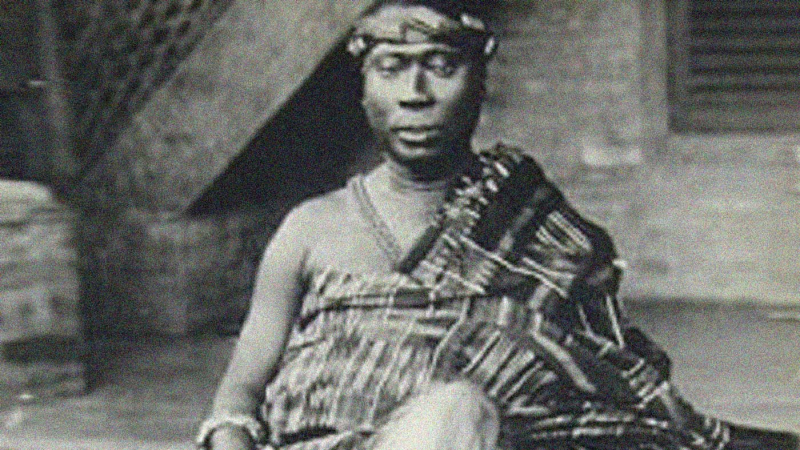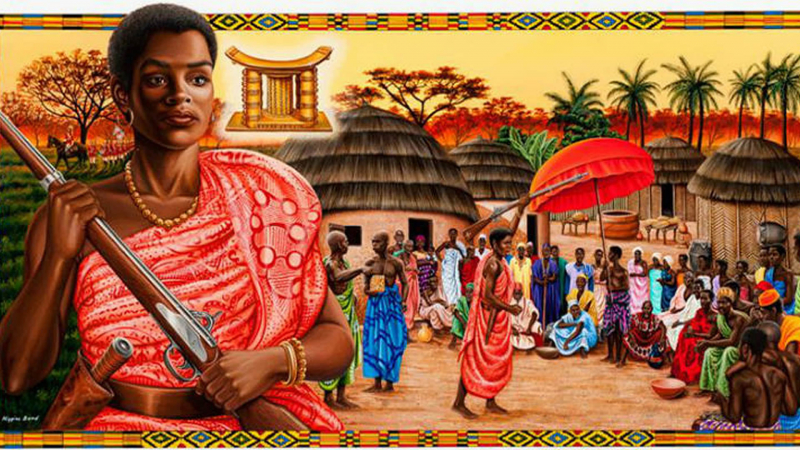Yaa Asantewaa
Yaa Asantewaa I (October 17, 1840 - October 17, 1921) was the Warrior Queen Mother of Ejisu in the Ashanti Empire, which is now part of modern-day Ghana. She was appointed by her brother Nana Akwasi Afrane Opese, the Edwesuhene, or ruler, of Edwesu. She led the Ashanti War of the Golden Stool, also known as the Yaa Asantewaa War of Independence, against the British Empire in 1900.
Among the most important historical figures in Ghana, Nana Yaa Asantewaa was well aware of the consequences of British colonial rule. Ghanaians today regard her as a queen mother who used her political and social clout to help defend her kingdom. The role she played in persuading Ashanti men to fight the British appears to be a function of her matriarchal status. Nana Yaa Asantewaa's appeal to the women of the Asante Empire is based on Akan women's political obligations and their respective roles in legislative and judicial processes. The Akan people's male stool hierarchy was supplemented by female counterparts. The village council, known as the ôdekuro, was made up of elders who were the heads of the matrilineages (mpanyimfo). The women, known as aberewa or ôbaa panyin, were in charge of women's affairs and were known as the mpanyinfo. An ôbaa panyin was the responsible party for the affairs of the village women and served on the village council for each ôdekuro .
The ôhene, the head of a division, and the Amanhene, the head of the autonomous political community, each had a female counterpart known as the ôhemaa: a female ruler who sat on their councils. The ôhemaa and ôhene shared the same mogya, or bloodline or localized matrilineage. Since her male counterpart was ex-officio of the Asanthene, the occupant of the female stool in Kumasi state, the Asantehemaa, the united Asante, was a member of the Kôtôkô Council, the Executive Committee or Cabinet of the Asanteman Nhyiamu, General Assembly of Asante rulers. Female stool occupants took part not only in judicial and legislative processes, but also in the making and unmaking of war, as well as in land distribution.
Yaa Asantewaa is a well-known figure in Asante history and Ghanaian history in general for her role in opposing British colonialism. The Yaa Asantewaa Girls' Secondary School was established in Kumasi in 1960 with funds from the Ghana Education Trust to emphasize the importance of encouraging more female leaders in Ghanaian society.
In the year 2000, Ghana held a week-long centennial celebration to honor Yaa Asantewaa's achievements. On 3 August 2000, a museum dedicated to her was dedicated in Kwaso, Ejisu-Juaben District, as part of these celebrations. Unfortunately, a fire on July 23, 2004 destroyed several historical items, including her sandals and battle dress (batakarikese), as seen in the photograph above. The current Queen-mother of Ejisu is Yaa Asantewaa II, and a second Yaa Asantewaa festival was held in Ejisu from August 1-5, 2006.







